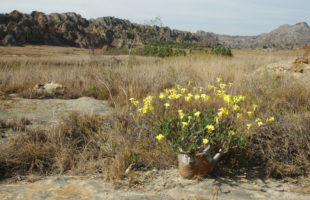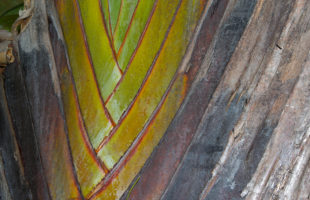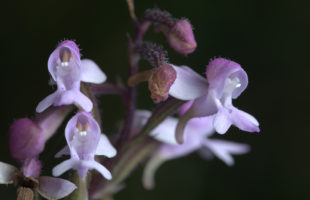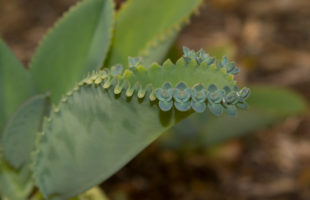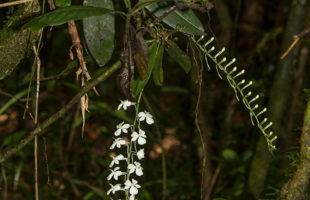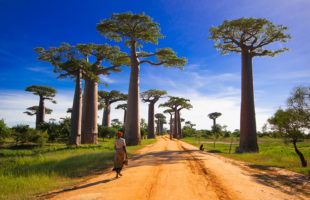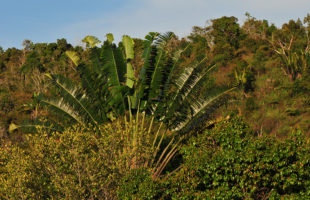Madagascar Palms Who doesn’t know them, the characteristic, bulbous trees of Madagascar? We are not talking about the world-famous baobabs, but the Madagascar palms. But they are not palms. They actually belong to the dogbane family. Better simply use the botanical name of the genus: Pachypodium. Pachypodium belong to the succulents, plants that are particularly good at storing water. You …
LesenA beauty of the highlands: Gastrorchis françoisii
Already the botanist Rudolf Schlechter praised the orchid Gastrorchis françoisii in 1925 as one of the most beautiful he would ever have described. And indeed it is: its large flowers, about 5 cm wide, pink on the outside and white and purple on the inside, with the striking yellow spot on the lip, are a real eye-catcher. And even among …
LesenIdentification help for Ravenalas
Since 2021, it has been known that there is not just one, but six different species of the Tree of Travelers. But how do they differ? This small identification guide should help to classify them. A complete article about the different Ravenalas and their occurrence can be found here: The Tree of Travelers. Photos will be added soon, until then …
LesenThe 1000 orchids of Madagascar
Madagascar, the tropical island in the Indian Ocean, is better known as the land of baobabs. In fact, Madagascar is also a paradise for orchids. Currently, over 1000 different species are described from the island, over 90% of which are endemic, i.e. only found on Madagascar. The name orchid, by the way, has a less than praiseworthy origin. It comes …
LesenMother of Thousands: Kalanchoe daigremontiana
In the south of Madagascar, many strange plants thrive. Only very special plants can adapt to the extremely dry and hot climate. One of them is the Mother of Thousands, with the scientific name Kalanchoe daigremontiana. It is still unclear whether the species should be assigned to the genus Kalanchoe or to the genus Bryophyllum. There is still a lack …
LesenRanomafana’s miniature flowers: Aerangis citrata
Aerangis citrata, also called Manta in Malagasy, is found on the entire eastern side of Madagascar. Wherever there is high humidity and permanently warm regions, it feels at home. From the coast up to 1500 m above sea level you can find this orchid. Like many orchids of Madagascar, Aerangis citrata lives epiphytically, i.e. it grows on branches of trees. …
LesenThe water tank of the South
Madagascar’s south put forth many quirky, mostly water saving plants. An especially strange and unique plant is Cyphostemma montagnacii. The shape of this plant seems to be not of this world: A small, gnarly stem merges into long vines. Indeed this strange plant belongs to the grapevine family. Its branches need a tree which they can climb up and which …
LesenThe country of Baobabs
What would Madagascar be without its giant landmarks, the mighty baobabs? Over here, they might be known as monkey bread, and have been famous as photo motives and in literatures for centuries. These huge trees, whose roots seems to grow into the sky, enchant everyone, and many baobabs are told to possess magic power. Madagascar has not less than seven …
LesenThe carnivore among plants
Carnivorous plants in Madagascar? Yes, there are! Two species of pitcher plants (Nepenthes madagascariensis and Nepenthes masoalensis) solely exist on the big island. You can find them in open, sunny areas on humid sandy soil along Madagascar’s east coast. In northern direction, they occur until Antongil bay and in southern direction until Tolagnaro (French Fort Dauphin). Mostly, large populations are …
LesenThe Tree of Travelers
The Ravenala, better known as the tree of travelers, belongs to the strelitzia family, despite resembling a palm tree. Although it is now common all over the world and is even cultivated as an ornamental plant in some homes, it originated in Madagascar and only occurs naturally there. Ravenalas grow from six to thirty meters and are particularly known for …
Lesen MADAMAGAZINE Your Magazine about Madagascar
MADAMAGAZINE Your Magazine about Madagascar
